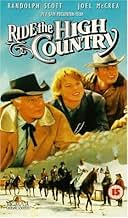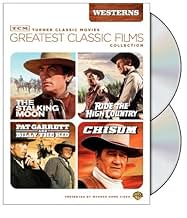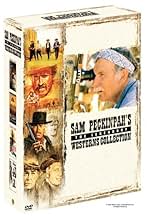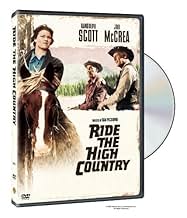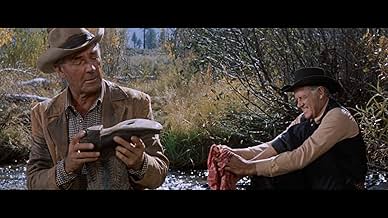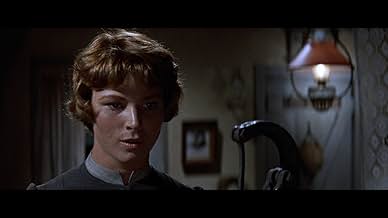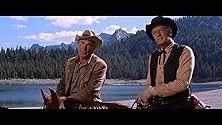IMDb RATING
7.4/10
16K
YOUR RATING
An ex-union soldier is hired to transport gold from a mining community through dangerous territory. But what he doesn't realize is that his partner and old friend is plotting to double-cross... Read allAn ex-union soldier is hired to transport gold from a mining community through dangerous territory. But what he doesn't realize is that his partner and old friend is plotting to double-cross him.An ex-union soldier is hired to transport gold from a mining community through dangerous territory. But what he doesn't realize is that his partner and old friend is plotting to double-cross him.
- Director
- Writers
- Stars
- Nominated for 1 BAFTA Award
- 2 wins & 2 nominations total
Alice Allyn
- Candy
- (uncredited)
George Bell
- Townsman
- (uncredited)
Oscar Blank
- Miner
- (uncredited)
Chet Brandenburg
- Miner
- (uncredited)
Don Brodie
- Spieler
- (uncredited)
Chris Carter
- Rose
- (uncredited)
- Director
- Writers
- All cast & crew
- Production, box office & more at IMDbPro
Featured reviews
It was goodbye to two stars from the golden age of Westerns and hello to a director who would help transform the genre into something bloodier, nastier, and truer. A skillful compromise of those visions, "Ride The High Country" presents a kind of crossroads that feels more like a destination, a perfect summing-up of the legend and the reality of the American West.
Steve Judd (Joel McCrea) is a weary old lawman trying to make ends meet as he nears the end of the road. To transport some gold from a mining town to a bank, he takes on the services of an old buddy, Gil Westrum (Randolph Scott). Westrum's as sleek and angling as Judd is square, and has more on his mind than collecting $10 a day risking his neck guarding someone else's money. While this remains unsettled, the pair gets mixed up with a woman (Mariette Hartley) who thinks she's in love with a miner whose idea of a honeymoon means sharing the wealth with his hideous brothers.
Ask anyone with a glancing knowledge of films what kind of movies Sam Peckinpah made, and they will likely describe a movie very different from this. There's some shooting, a little blood, and an unshaven Warren Oates, but otherwise "Ride The High Country" is a movie in the classic Western mold. There are some dissonances for Scott and McCrea's old-time fans to sort through, like Scott's ambiguous morality, but this is all-in-all the nicest movie Peckinpah ever made, decent characters set against an inspiring landscape, the kind of yarn John Ford or Anthony Mann would have delivered.
Not that everything is too black-and-white. The girl, having escaped her stern father and the stump farm where they lived, asks Judd at one point about right and wrong: "It isn't that simple, is it?" "No, it isn't," Judd replies. "It should be, but it isn't."
McCrea is the center of this film, a pillar of virtue. He quotes the Bible, but it's not clear he's especially religious or just stoic in the classic tradition. When he talks about his simple desire "to enter my house justified," he may have the Christian meaning in mind, or just the humanistic ideal of having been a good man when all is said and done. Nevertheless, there are intimations of a deeper truth in the redemption of Westrum and his unambiguous last line: "I'll see you later."
Peckinpah does present a bull-headed Christian zealot in R.G. Armstrong as the girl's father, but he's essentially decent, afraid of life, what it did to him and can do to her. Some see a suggestion of incest in their relationship, when she tells him he doesn't want her with any man but him, but it's more likely that's her complaining about his being overprotective.
There's a lot of humor here, too, much of it courtesy of Randolph Scott. Scott could be a stiff in other films; here he settles nicely into the role of a cut-up, like when he watches his young charge Heck get the tar beaten out of him twice without lifting a finger to help him. "Good fight, I enjoyed it," Westrum chirps as the boy licks his wounds.
The film culminates in a good fight with the Hammonds, so ornery they jeer at Heck when he brings the girl to their doorstep and she assures them he was a gentleman: "How come? Something wrong with him?" It's the one gunfight in the film, and though its one more than some Peckinpah films like "Junior Bonner" had, it's another reason for the film sticking out as unusual in the director's oeuvre.
But it's a good kind of difference, for the most part, as Peckinpah finds his métier while paying tribute to those who came before him with the help of McCrea and Scott. Like its heroes, "Ride The High Country" moves a little slowly in parts, but watching it, you'll likely agree with me the long journey is worth the ride.
Steve Judd (Joel McCrea) is a weary old lawman trying to make ends meet as he nears the end of the road. To transport some gold from a mining town to a bank, he takes on the services of an old buddy, Gil Westrum (Randolph Scott). Westrum's as sleek and angling as Judd is square, and has more on his mind than collecting $10 a day risking his neck guarding someone else's money. While this remains unsettled, the pair gets mixed up with a woman (Mariette Hartley) who thinks she's in love with a miner whose idea of a honeymoon means sharing the wealth with his hideous brothers.
Ask anyone with a glancing knowledge of films what kind of movies Sam Peckinpah made, and they will likely describe a movie very different from this. There's some shooting, a little blood, and an unshaven Warren Oates, but otherwise "Ride The High Country" is a movie in the classic Western mold. There are some dissonances for Scott and McCrea's old-time fans to sort through, like Scott's ambiguous morality, but this is all-in-all the nicest movie Peckinpah ever made, decent characters set against an inspiring landscape, the kind of yarn John Ford or Anthony Mann would have delivered.
Not that everything is too black-and-white. The girl, having escaped her stern father and the stump farm where they lived, asks Judd at one point about right and wrong: "It isn't that simple, is it?" "No, it isn't," Judd replies. "It should be, but it isn't."
McCrea is the center of this film, a pillar of virtue. He quotes the Bible, but it's not clear he's especially religious or just stoic in the classic tradition. When he talks about his simple desire "to enter my house justified," he may have the Christian meaning in mind, or just the humanistic ideal of having been a good man when all is said and done. Nevertheless, there are intimations of a deeper truth in the redemption of Westrum and his unambiguous last line: "I'll see you later."
Peckinpah does present a bull-headed Christian zealot in R.G. Armstrong as the girl's father, but he's essentially decent, afraid of life, what it did to him and can do to her. Some see a suggestion of incest in their relationship, when she tells him he doesn't want her with any man but him, but it's more likely that's her complaining about his being overprotective.
There's a lot of humor here, too, much of it courtesy of Randolph Scott. Scott could be a stiff in other films; here he settles nicely into the role of a cut-up, like when he watches his young charge Heck get the tar beaten out of him twice without lifting a finger to help him. "Good fight, I enjoyed it," Westrum chirps as the boy licks his wounds.
The film culminates in a good fight with the Hammonds, so ornery they jeer at Heck when he brings the girl to their doorstep and she assures them he was a gentleman: "How come? Something wrong with him?" It's the one gunfight in the film, and though its one more than some Peckinpah films like "Junior Bonner" had, it's another reason for the film sticking out as unusual in the director's oeuvre.
But it's a good kind of difference, for the most part, as Peckinpah finds his métier while paying tribute to those who came before him with the help of McCrea and Scott. Like its heroes, "Ride The High Country" moves a little slowly in parts, but watching it, you'll likely agree with me the long journey is worth the ride.
"In simple terms, Ride the High Country was about salvation and loneliness" - Sam Peckinpah
Both in their 60s at the time, Joel McCrea and Randolph Scott summed up their careers in Sam Peckinpah's second film, Ride the High Country. After two hundred films between them, this was Scott's final film and McCrea's second to last. The film was shot in only twenty-six days and played mostly as bottom filler for double bills. It was only after winning first prize at the Cannes Film Festival that it began to be appreciated for the true classic it is. Set in the early days of the century, the days of the cowpoke are giving way to the modern modes of transportation and communication. People like lawman Steve Judd (Joel McCrea), with a reputation for fierce integrity may be obsolete in the New West but his dignity and strength of character make him a hero worthy of admiration.
The film is both a lament for the passing of the Old West and a gentle celebration of humanity's search for friendship, honor, and trust. Both men feel they have somehow failed to live up to their standards and want one more chance to redeem their honor. Judd wants to recapture some measure of self-respect while Westrum looks for the material wealth that has always eluded him. As the film opens, Judd hires his ex-deputy Gil Westrum (Randolph Scott) to help him transport a shipment of gold bullion down from the high Sierras, a job in which six prior attempts ended in failure. Against Judd's advice, they bring along a third man - a wild, womanizing youth named Heck Longtree (Ron Starr), who proves to them that he can handle himself in a fistfight.
Things get complicated when they spend the night at a farm run by puritanical Joshua Knudson (R.G. Armstrong) and Heck is taken with his beautiful daughter Elsa (Mariette Hartley). Feeling thwarted by her possessive and moralizing father, Elsa runs away with the trio hoping to find a miner, Billy Hammond (James Drury) who has promised to marry her. As they ride up into the hills, the cinematography by Lucien Ballard reflects the beauty of the West as it has rarely been seen. When they arrive, things go from bad to worse for Elsa. Preceded by a marvelously comic horseback parade in which the boys sing When the Roll is Called Up Yonder, she is married to Billy in a saloon presided over by an inebriated judge.
Unfortunately, she has to be rescued by Judd after Billy Boy plans to share his bride with his four redneck brothers on their wedding night. The wedding scene is shown from Elsa's point of view and it is sympathetic and touching. On the way back with the gold, however, Gil turns on his old friend, plotting with Heck to steal the gold. In a famous exchange, Gil asks Judd, `Pardner, you know what's on the back of a poor man when he dies? The clothes of pride. Is that all you want?' To this Judd replies `All I want is to enter my house justified.' When the travelers encounter the Hammond boys waiting to ambush them at the farm, both men must confront their deepest fears and their noblest truths.
Both in their 60s at the time, Joel McCrea and Randolph Scott summed up their careers in Sam Peckinpah's second film, Ride the High Country. After two hundred films between them, this was Scott's final film and McCrea's second to last. The film was shot in only twenty-six days and played mostly as bottom filler for double bills. It was only after winning first prize at the Cannes Film Festival that it began to be appreciated for the true classic it is. Set in the early days of the century, the days of the cowpoke are giving way to the modern modes of transportation and communication. People like lawman Steve Judd (Joel McCrea), with a reputation for fierce integrity may be obsolete in the New West but his dignity and strength of character make him a hero worthy of admiration.
The film is both a lament for the passing of the Old West and a gentle celebration of humanity's search for friendship, honor, and trust. Both men feel they have somehow failed to live up to their standards and want one more chance to redeem their honor. Judd wants to recapture some measure of self-respect while Westrum looks for the material wealth that has always eluded him. As the film opens, Judd hires his ex-deputy Gil Westrum (Randolph Scott) to help him transport a shipment of gold bullion down from the high Sierras, a job in which six prior attempts ended in failure. Against Judd's advice, they bring along a third man - a wild, womanizing youth named Heck Longtree (Ron Starr), who proves to them that he can handle himself in a fistfight.
Things get complicated when they spend the night at a farm run by puritanical Joshua Knudson (R.G. Armstrong) and Heck is taken with his beautiful daughter Elsa (Mariette Hartley). Feeling thwarted by her possessive and moralizing father, Elsa runs away with the trio hoping to find a miner, Billy Hammond (James Drury) who has promised to marry her. As they ride up into the hills, the cinematography by Lucien Ballard reflects the beauty of the West as it has rarely been seen. When they arrive, things go from bad to worse for Elsa. Preceded by a marvelously comic horseback parade in which the boys sing When the Roll is Called Up Yonder, she is married to Billy in a saloon presided over by an inebriated judge.
Unfortunately, she has to be rescued by Judd after Billy Boy plans to share his bride with his four redneck brothers on their wedding night. The wedding scene is shown from Elsa's point of view and it is sympathetic and touching. On the way back with the gold, however, Gil turns on his old friend, plotting with Heck to steal the gold. In a famous exchange, Gil asks Judd, `Pardner, you know what's on the back of a poor man when he dies? The clothes of pride. Is that all you want?' To this Judd replies `All I want is to enter my house justified.' When the travelers encounter the Hammond boys waiting to ambush them at the farm, both men must confront their deepest fears and their noblest truths.
An above average Western featuring two of the genres most recognizable stars, Joel McCrea and Randolph Scott (in his last film). Both men have a history together as outlaws, but McCrea has gone straight and is now in charge of getting the gold from the mines to the bank. To help him, he hires his old friend Scott who, along with a young hothead (Ron Starr), is in town dressed up like "Buffalo Bill" and demonstrating his fancy shooting.
Scott believes he can persuade his old partner to split the gold with him before they return, and must act as a buffer between the impatient young ruffian and his old friend. While en route, the three encounter a religious farmer (R. G. Armstrong) and his under socialized daughter (Mariette Hartley), who steals away to join them.
The trouble really begins when they get to the remote mining town, encountering an inbred mountain family of hoodlums (which includes Warren Oates) and its judge (Edgar Buchanan).
Directed by Sam Peckinpah, and written by N.B. Stone Jr., it was added to the National Film Registry in 1992.
Scott believes he can persuade his old partner to split the gold with him before they return, and must act as a buffer between the impatient young ruffian and his old friend. While en route, the three encounter a religious farmer (R. G. Armstrong) and his under socialized daughter (Mariette Hartley), who steals away to join them.
The trouble really begins when they get to the remote mining town, encountering an inbred mountain family of hoodlums (which includes Warren Oates) and its judge (Edgar Buchanan).
Directed by Sam Peckinpah, and written by N.B. Stone Jr., it was added to the National Film Registry in 1992.
Randolph Scott and Joel McCrea will probably be remembered as the top "B" western stars in movies. But their last film "Ride the High Country" stands as an "A" western and a very good one too.
Perhaps they owe this final chance to director Sam Peckinpah who turns the story into a splendid film in its genre shot in beautiful outdoor sceneries, with very well managed action scenes, a credible script, great settings and a fine musical score too.
Two moments are particularly outstanding in my opinion: the sort of "Fellinesc" sequence at the wedding with all those bizarre characters and the final showdown where Scott and McCrea face the mean Hammond brothers (John Anderson, James Drury and Warren Oates) in the "old fashioned way".
A well deserved "A" product for both actors -that amused and thrilled us western fans- through their long careers in the genre.
Perhaps they owe this final chance to director Sam Peckinpah who turns the story into a splendid film in its genre shot in beautiful outdoor sceneries, with very well managed action scenes, a credible script, great settings and a fine musical score too.
Two moments are particularly outstanding in my opinion: the sort of "Fellinesc" sequence at the wedding with all those bizarre characters and the final showdown where Scott and McCrea face the mean Hammond brothers (John Anderson, James Drury and Warren Oates) in the "old fashioned way".
A well deserved "A" product for both actors -that amused and thrilled us western fans- through their long careers in the genre.
RIDE THE HIGH COUNTRY proves that the Old West was a dangerous place for anyone willing to transport gold from a mining town to a bank with a couple of double-crossing cronies as companions and a runaway girl to protect.
JOEL McCREA and RANDOLPH SCOTT are the willing participants, a lawman and his corrupt pal, and MARIETTE HARTLEY is the girl who wants to escape the clutches of a cruel father and marry Billy Hammond (JAMES DRURY). She joins Scott and McCrea but doesn't realize what she's in for when she meets up with her ornery fiancé and his psychotic brothers, one of whom is played by WARREN OATES. She also has to contend with the advances of Scott's young pal, RON STARR, who doesn't want to see her get mixed up with Drury and his brothers.
The plot stays focused on these characters, moves slowly and is photographed with finesse by Lucien Ballard who filmed it in CinemaScope and Metrocolor in some gorgeous natural settings. It's a character-driven tale that has a moral compass but never becomes too preachy in the telling.
First-rate performances by McCrea and Scott hold the film together with the others being competent enough to stand inspection. The big mystery to me is: What happened to Ron Starr? He was certainly adequate enough and seemed to grow in the role as the film progressed, looking somewhat like a young Glenn Campbell. His bio at IMDb is very incomplete, so there's no telling what actually happened to him.
Summing up: Sturdy western with downbeat ending is interesting all the way through.
JOEL McCREA and RANDOLPH SCOTT are the willing participants, a lawman and his corrupt pal, and MARIETTE HARTLEY is the girl who wants to escape the clutches of a cruel father and marry Billy Hammond (JAMES DRURY). She joins Scott and McCrea but doesn't realize what she's in for when she meets up with her ornery fiancé and his psychotic brothers, one of whom is played by WARREN OATES. She also has to contend with the advances of Scott's young pal, RON STARR, who doesn't want to see her get mixed up with Drury and his brothers.
The plot stays focused on these characters, moves slowly and is photographed with finesse by Lucien Ballard who filmed it in CinemaScope and Metrocolor in some gorgeous natural settings. It's a character-driven tale that has a moral compass but never becomes too preachy in the telling.
First-rate performances by McCrea and Scott hold the film together with the others being competent enough to stand inspection. The big mystery to me is: What happened to Ron Starr? He was certainly adequate enough and seemed to grow in the role as the film progressed, looking somewhat like a young Glenn Campbell. His bio at IMDb is very incomplete, so there's no telling what actually happened to him.
Summing up: Sturdy western with downbeat ending is interesting all the way through.
Did you know
- TriviaFinal film of Randolph Scott. He retired from acting once he saw the finished film, saying he wanted to quit while he was ahead and that he would never be able to better his work here.
- GoofsThe many 34-star flags, all on flagpoles, at the opening of the movie do not match the Bobby helmets, open automobiles and electric wiring over the streets. The 34-star U.S. flag was in use only from 1861-1863. There is, however, also an inconsistent 45-star flag strung across the street. That design, in use from 1896-1908, does match the movie's time setting.
- Quotes
Steve Judd: All I want is to enter my house justified.
- Crazy creditsIntroducing Mariette Hartley
- ConnectionsFeatured in Il était une fois l'Amérique (1976)
Details
- Release date
- Country of origin
- Languages
- Also known as
- Pistoleros al atardecer
- Filming locations
- Mammoth Lakes, California, USA(Twin Lake, Horseshoe Lake)
- Production company
- See more company credits at IMDbPro
Box office
- Budget
- $813,000 (estimated)
- Runtime
- 1h 34m(94 min)
- Color
- Aspect ratio
- 2.35 : 1
Contribute to this page
Suggest an edit or add missing content


